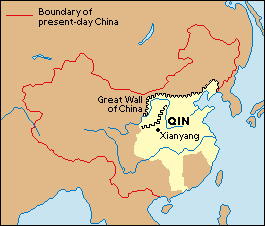Qin, << chihn, >> dynasty, also spelled Ch’in, was a Chinese dynasty (family of rulers) that governed from 221 B.C. to 206 B.C. The dynasty began after Shi Huangdi, ruler of the state of Qin, conquered rival states to the east. He later extended his rule to southeastern China. The dynasty maintained firm control over the areas it ruled. Earlier, local Chinese chiefs had much control over their regions.

Shi Huangdi made local rulers move to his new capital at Xianyang (near present-day Xi’an) and appointed local administrators who were responsible to him. He banned most books in an attempt to silence critics, to promote obedience, and to blot out knowledge of the past. He constructed walls that connected with older border walls to keep invaders out. This marked the start of the Great Wall of China. He standardized weights and measures, currency, and the Chinese script. Shi Huangdi also gave his country a lasting ideal—national unity. The name China came from the name of his dynasty.

Shi Huangdi died in 210 B.C., and his son proved to be a weak ruler. Rebellions began in 209 B.C., and the Qin dynasty soon collapsed. The Han dynasty then gained control of China.
